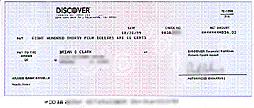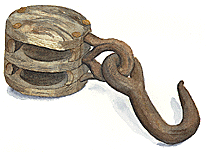


Strangely enough, they suddenly wanted to cooperate with me. We ended up settling out of court for $750 + plus court costs, and I collected $50 from them when the whole thing began for a net gain of $800. My suit asked for $950 plus court costs, and judging by how happy they seemed to go along with $750, I now know that I should have pressed for more. But hey--the important thing is that Discover had to shell out some dough, be it $800 or $1000.
What follows is a copy of the suit I filed against Discover Card with comments on the right. The suit is a matter of public record, so feel free to use it to get ideas for yourself. That's how I got my text. But remember, I'm no lawyer, so I can't give legal advice. What you see here is just my take on the lawsuit I filed, and the suit is a matter of public record, and therefore NOT copyrighted.
COUNT I - TELEPHONE CONSUMER PROTECTION ACT OF 1991
2. Shortly thereafter, Plaintiff called the number contained in Defendant's direct mail solicitation and was connected with a person who identified herself as a sales agent for Defendant. 3. Plaintiff told Defendant's agent that he would be willing to allow Defendant to issue him a Discover Card only if Defendant would agree never to solicit Plaintiff for any reason via the telephone. Defendant's agent stated that she had the authority to ensure that Plaintiff's request was complied with. Plaintiff then agreed to receive a Discover Card issued by Defendant. 4. Shortly thereafter, Plaintiff received a Discover Card in the mail. Plaintiff used the card to make purchases, received bills from Defendant, paid those bills, and had his payments accepted by Defendant. 5. On February 21, 1998 at approximately 10:27 in the morning, Plaintiff received a call from someone who identified himself as Mike Brodgy (spelling unconfirmed) and stated that he was calling on behalf of Defendant.
|
As a wise man told me, "Switch to Bob Dole mode here," meaning I should talk about myself in the third person--oops, I mean... He talked about himself in the third person. I identified "the Plaintiff" as me, and from then on, refered to myself as "Plaintiff." Same deal with the "Defendant," also known as Telemarketing Scum. |
|
6. On information and belief, (a) Brodgy worked for a telemarketing firm known as APAC, (b) Defendant or its agent hired APAC to solicit Defendant's customers, and (c) Defendant provided APAC with Plaintiff's name and telephone number for the express purpose of having APAC solicit Plaintiff on Defendant's behalf.
|
The way I understand it, this "On information and belief" bit means that I can swear under oath that this is true, and if I've made an error in the person's name or the company, I won't get nailed for perjury or have the case dismissed for a minor inaccuracy as long as I am honestly under the impression that this is the truth. If I out and out lie, however, I'm screwed (and should be). Also, if I understand correctly, this means that the company will then have to track down the person who made the call and get a similar legal statement from them. This means research. This means time. This means I'm being a huge pain to them, and it becomes more attractive to just settle, rather than try and kick me around in court. |
|
7. Defendant's February 1998 telephone solicitation of Plaintiff constitutes a violation of the Telephone Consumer Protection Act of 1991 (47 U.S.C.A. 221 et. seq.), for which Plaintiff is entitled $500 in Damages. This amount will be offset by $50, which will be explained in Count II, paragraph 18. WHEREFORE Plaintiff, Brian Clark, respectfully requests this Court award him $450 in damages along with any other appropriate relief.
|
Paragraph 7 is where I sum up what all the preceding paragraphs have to do with the lawsuit, and why (or WHEREFORE) I specify how much money I'm asking for. The WHEREFORE bit is necessary as far as I can see, and the "along with any other appropriate relief" part is to cover court costs, and if the Judge is feeling particularly angry at the Telemarketer, maybe an additional penalty--who knows? |
|
14. Plaintiff contacted Defendant's Customer Relations Headquarters in Deerfield, Illinois at a number given to him by Defendant's customer service 800 number. Plaintiff was eventually connected with Mr. Daniel Moran,who identified himself as an agent for Defendant. 15. Plaintiff demanded payment pursuant to the claim set forth in Count I. 16. Mr. Moran, acting on behalf of the Defendant, refused to comply with Plaintiff's demand, but offered instead an alternative solution. Mr. Moran suggested that Defendant credit Plaintiff's account with $50 and guaranteed that Plaintiff would never again receive a solicitation for any reason on behalf of or originating from Defendant. 17. Plaintiff settled his claim for $50 only after Moran promised that neither Defendant nor its agents would ever again solicit Plaintiff by telephone. 18. Plaintiff's Discover account was credited with $50, which was reflected in the next statement received by Plaintiff. This shows that Defendant recognized their violation of Telephone Consumer Protection Act, and that Defendant knew they were getting a bargain in being let off with one-tenth of the appropriate fine. 19. On January 4, 1999, Plaintiff received a call at 8:38 in the evening from a woman who identified herself as Virginia Padilla (spelling not confirmed) of the telemarketing firm Promark One. Ms. Padilla said that knew that Plaintiff was a Discover Card holder, and that Defendant had provided Promark One the name and telephone number for the purpose of soliciting Plaintiff on behalf of Defendant. Ms. Padilla also provided Plaintiff with PRL Number 0532815539 in reference to the call, which is presumably used to track calls.
|
|
|
20. On information and belief, (a) Padilla worked for a telemarketing firm known as Promark One, (b) Defendant or its agent hired Promark One to solicit Defendant's customers, and (c) Defendant provided Promark One with Plaintiff's name and telephone number for the express purpose of having Promark One solicit Plaintiff on Defendant's behalf. 21. Up to the point of Defendant's breach, Plaintiff performed all his obligations under the agreement between the parties.
|
There's that "On information and belief" working for me again. And Paragraph 21 is there to point out that I kept my part of the bargain. It's a technicality, but necessary when going for the breach of contract angle. |
|
22. Defendant breached its contract with Plaintiff by hiring a telemarketing firm which solicited Plaintiff in January 1999. Plaintiff forfeited $450 of his $500 statutory claim against defendant in exchange for defendant's covenant. As a result of defendant's breach of that covenant, Plaintiff has lost the benefit of the bargain and is entitled to $450 in damages. WHEREFORE Plaintiff, Brian Clark respectfully requests this Court award him $450 in damages along with any other appropriate relief. COUNT III - TELEPHONE CONSUMER PROTECTION ACT OF 1991 23-30. Plaintiff realleges paragraphs 8 through 21 of Count II. 31. Defendant's January 1999 telephone solicitation of Plaintiff constitutes a violation of the Telephone Consumer Protection Act of 1991 (47 U.S.C.A. 221 et. seq.), for which Plaintiff is entitled $500 in Damages. WHEREFORE Plaintiff, Brian Clark, respectfully requests this Court award him $500 in damages along with any other appropriate relief.
|
|
|
Under penalties as provided by law pursuant to Section 1-109 of the Code of Civil procedure, the undersigned certifies that the statements set forth in this instrument are true and correct, except as to matters therein stated to be on information and belief, and as to such matters the undersigned certifies as aforesaid, that he verily believes the same to be true. Dated this 9th day of July, 1999. |
This section is where I swear it's all true, and it's like swearing under oath. Therefore, it's important that I'm honest and straightforward, and haven't exaggerated. |
There it is. It worked. 'nuff said.
To be honest, I probably didn't need all this legal jargon. Small claims court is for people who DON'T want to deal with all this. A well written, straightforward letter would do, but I think I took Discover totally by surprise with this one.